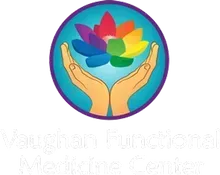Functional & Integrative Medicine
Functional Medicine is an evolution in the practice of medicine that better addresses the health care needs of the 21st century. The Functional Medicine model shifts from the traditional disease-centered focus of medical practice to an individualized, patient-centered, science-based approach that empowers patients and practitioners to work together to address the whole person, not just an isolated set of symptoms. This is the model of Vaughan Functional Medicine Center in Jefferson City, MO.
How Are Functional Medicine Practitioners Different
Functional Medicine practitioners spend time with their patients, listening to their histories and looking at each patient’s genetic, biochemical, environmental, and lifestyle factors that influence long-term health and complex, chronic disease.
By addressing root cause, rather than symptoms, practitioners can create direct personalized treatment plans that lead to improved patient outcomes and promote optimal wellness. Functional Medicine involves understanding the origins, prevention, and treatment of complex, chronic disease. Hallmarks of a Functional Medicine approach include:
Patient Centered Care
The focus of functional medicine is on patient-centered care, promoting health as a positive vitality, beyond just the absence of disease.
An Integrative, Science-Based Health Care Approach
Functional Medicine practitioners look "upstream" to consider the complex web of interactions in the person's history, physiology, and lifestyle that can lead to illness. The unique genetic makeup of each patient is considered, along with both internal (body, mind, and spirit) and external (physical and social environment) factors that affect total functioning.
Integrating Best Medical Practices
Functional Medicine integrates traditional Western medical practices with what are sometimes considered "alternative" or "integrative" medicine, creating a focus on prevention through nutrition, diet, sleep, stress management, and exercise; use of the latest laboratory testing and other diagnostic techniques; and prescribed combinations of drugs, and/or botanical medicines, supplements, therapeutic diets, detoxification programs, or stress management techniques.
Functional Medicine is Founded on the 4P's
Preventive
Using proactive versus reactive approaches which shifts the focus from illness to wellness, and from disease treatment to functional enhancement.
Participatory
It empowers and engages the patient, with the physician as guide, coach, and facilitator, a collaborative relationship versus an authoritative one.
Why Do We Need Functional Medicine?
Our society is experiencing a sharp increase in the number of people who suffer from complex, chronic diseases such as diabetes, heart disease, cancer, mental illness, and autoimmune disorders like rheumatoid arthritis or Hashimoto's hypothyroidism.
The system of medicine practiced by most physicians is oriented toward acute care, the diagnosis and treatment of trauma or illness that is of short duration and in need of urgent care, such as appendicitis or a fractured leg.
Unfortunately, the acute-care approach to medicine lacks the proper methodology and tools for preventing and treating complex, chronic disease.
There's a huge gap between research and the way doctors practice. The gap between emerging research in basic sciences and integration into medical practice is enormous—sometimes 50 years—particularly in the area of complex, chronic disease.
Most physicians are not adequately trained to assess the underlying causes of complex, chronic disease and to apply strategies such as nutrition, diet, and exercise to both treat and prevent these illnesses in their patients.





